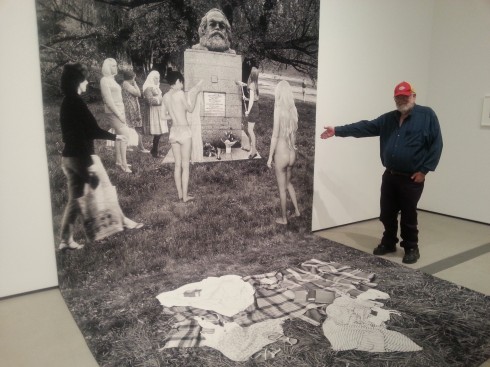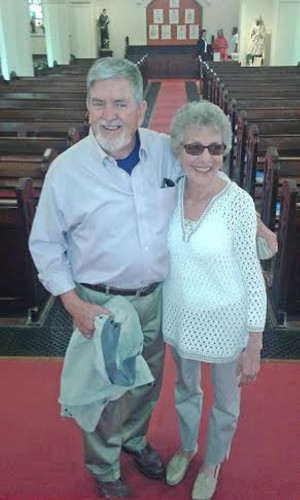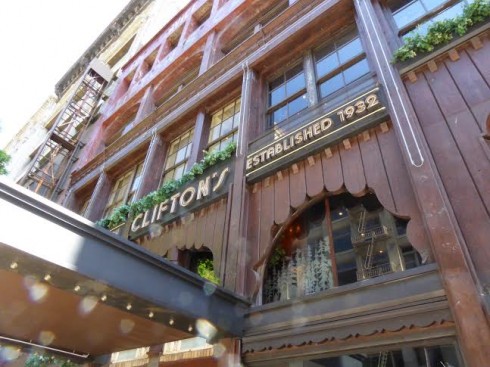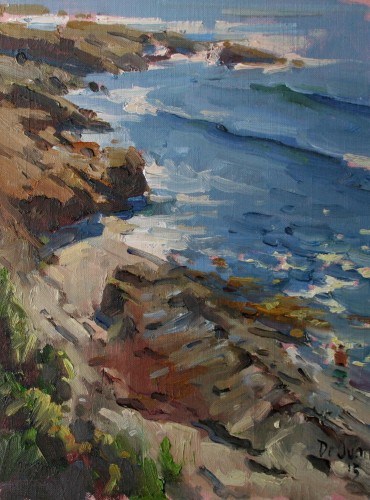California Dreaming: Hollywood Witch Hunters Fought Reds First, But Mike Salisbury Says He Finished The Job With Sex, Drugs & Rock
By Mary Reinholz
“I hate to advocate drugs, alcohol, violence or insanity, but they’ve always worked for me.” — Hunter S. Thompson
By Mary Reinholz
“I hate to advocate drugs, alcohol, violence or insanity, but they’ve always worked for me.” — Hunter S. Thompson
When Mike Salisbury was art director at Rolling Stone and known to colleagues as Mad Dog, he encountered famed gonzo journalist Hunter Thompson in a darkened North Beach theater where Bob Marley was to perform.
Thompson happened to be sitting in front of Salisbury. He offered him a tab of LSD with a line print in blue of Mr. Natural.
“Take it, Mad Dog,” Thompson said, according to an entry in Salisbury’s blog, “One Hell of an Eye,” posted a few years after Thompson’s 2009 death from a self-inflicted gunshot wound in Woody Creek, Colorado, and again on Facebook more recently.
Salisbury, who now lives in Venice and is an occasional guest speaker at Art Center College of Design in Pasadena, told me he kept Thompson’s gift for years until it “melted” in his wallet. “I never dropped that acid,” he explained in his blog. “I never actually dropped any. A Mad Dog needs no help. And the tab was my seal of Hunter’s approval.”
Not much has curbed Salisbury’s stride since that long ago time when he redesigned Rolling Stone and before that West magazine, the Los Angeles Times’ defunct but still widely admired Sunday supplement that supported the New Journalism of the era. (Full disclosure: This writer was on retainer for West for a few years but barely knew Salisbury, then or now.) Read more
AN UNUSUAL BOHEMIA IN SOUTHERN CALIFORNIA
By LIONEL ROLFE
There are some who would say that Bohemia is a state of mind, but they should add it also has to have a particular time and place. In the case of this book, the time and place is the southern half of the Golden State over the last century or so, and the state of mind is Bohemia—in all its many multitudinous variations. The book almost makes you believe that the true home of Bohemia was not, as so many thought, the left bank of Paris or the coffeehouses of San Francisco that Mark Twain and Herman Melville frequented during the Gold Rush, but Los Angeles and environs.
True, the counter culture was created in Los Angeles, and it was a distillation of bohemianism. A couple of things document this—the Renaissance Pleasure Faire, which still goes on since. It was created in 1963. The “Los Angeles Free Press” went into business about the same time—and it had a definite impact at the time. It was the first and largest of the Underground press of the ‘60s. What its effect is today can be debated forever.
The first faire was in the backyard of a house in Laurel Canyon. The faire was thrown as a promotion for Radio Station KPFK. And Art Kunkin did a prototype “Freep” to promote the faire and station.
The first faire’s organizers were Ron and Phyllis Patterson. Kunkin threw in his lot with them and thus did both faire and paper become pillars of the counter culture community. The counter culture was defined mostly by its support of civil rights and it opposition to the Vietnam War. Read more
Can the Broad Museum Threaten the Tate Modern?
BY LIONEL ROLFE
I have to admit that as a partisan of so-called “classical music” and great writing as summed up by the likes of Mark Twain and Beethoven, I’ve never been particularly impressed by modern art or grants-supported “serious music,” forms of art mostly appreciated by the academic world.
When my friend Anthea Raymond, the famed broadcaster (she ran KPCC for a while) and editor, invited me to see the Broad Museum on Grand Avenue in downtown Los Angeles with her, she was expecting to see my antediluvian ways.
Raymond surely wanted to introduce me to the Broad Museum even before I had my “minor stroke.” I assured her I was coming, despite the weakness and pain. I was curious if the Broad could at all compare to the Tate Modern I saw in London right after the Millennia. Read more
YOU CAN GO HOME AGAIN
Michael and Sue Harrison return to Birmingham, England
By Michael Harrison
Gertrude Stein once famously described her childhood home of Oakland by saying “there is no ‘there, there’,” but our family certainly did not find that to be the case in returning to our native Birmingham, England last month.
My wife Sue and I decided to celebrate our 50th Anniversary in the church where we were married at Erdington Abbey in Birmingham. The trip represented the first time that we would be in England with all three of our sons at the same time. Our eldest son Sean brought along his girlfriend Jeanine, while Ian was accompanied by his eight year-old daughter Isabel (Izzy). Youngest son Neil was there with his nine-year old daughter Ava.
Unfortunately, a goodly number of those that had attended the wedding a half-century earlier are sadly, no longer with us. Both sets of parents are gone, some siblings as well, but a sister, numerous nephews and nieces, and their attendant offspring are still living there. We felt there were several family members who would be joining us in the celebration of our 50-year odyssey. So off we set on our search for Stein’s elusive “there, there.” Read more
Drastic Flaws Revealed in City and State Oversight of Urban Oil Drill Sites
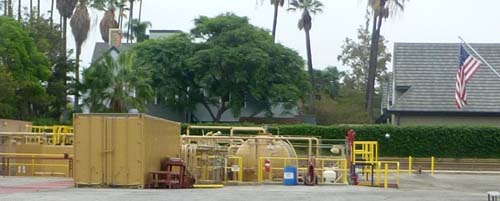
AllenCo Energy oil drill site in West Adams’ University Park neighborhod. Closed since September 2013, the company is asking to resume pumping oil. Note the immediate proximity of residential housing just over the drill site’s back wall. Hundreds of people were sickened before the operation shut down.
Leslie Evans
The AllenCo Energy company, whose 21-well urban oil field at 814 W. 23rd Street in the University Park neighborhood just north of USC sickened hundreds of people from uncontrolled fumes, is now pressing to resume drilling operations, shut down since November 2013. This has brought some serious media attention, revealing a shocking systemic failure of both Los Angeles and California state oversight of such urban oil operations.
The state’s regulatory agency, the Division of Oil, Gas and Geothermal Resources (DOGGR), under pressure for failing to turn in reports for several years, released an audit of its work on October 8. This revealed that the agency has not conducted its required annual review of “most oil projects” in the Los Angeles area since 2007. The L.A. Times summarized: Read more
RENOVATED CLIFTON’S INTRODUCES CAFETERIA NOIR
By Bob Vickrey
Remember that disorienting feeling as a kid when you came out of a dark movie theater after the Saturday matinee and made the difficult adjustment to the harsh afternoon sunlight?
That was the same bewildering feeling our monthly lunch group had recently as we emerged from the dark labyrinth of mysterious corridors in the newly refurbished Clifton’s Cafeteria in downtown Los Angeles.
If there is such a thing as cafeteria noir, the owners have certainly succeeded in creating the definitive dream-like dining experience. Surely, surrealistic filmmaker David Lynch had some input into the set decoration here. And I’m guessing the ghost of Vincent Price provided the inspiration for the eerie lighting throughout the place. Read more
Honey thinks about the Astrolabe and the Compass and of Apple Inc.
NOTES FROM ABOVE GROUND
By Honey van Blossom
(Honey is a Belgian Marxist former strip-tease artiste)
Picture of Pacific Ocean by Jose L. de Juan, copyright 2015.
Jules Vern’s Captain Nemo (Meaning “no one” from Homer’s Odysseus – Odysseus said he was “No Man.”) traveled 20,000 leagues under the sea in a submarine. The title did not mean the Nautilus went 20,000 leagues deep in the water but that the vessel traveled 20,000 leagues while under water. The nautilus (from the Latin form the original Greek word “sailor”) is a marine mollusk, and its bony body structure is externalized as shell divided into chambers. The planisphere mentioned below was a star chart the shows the celestial sphere on a plane.
The narrator of the novel writes: Read more

